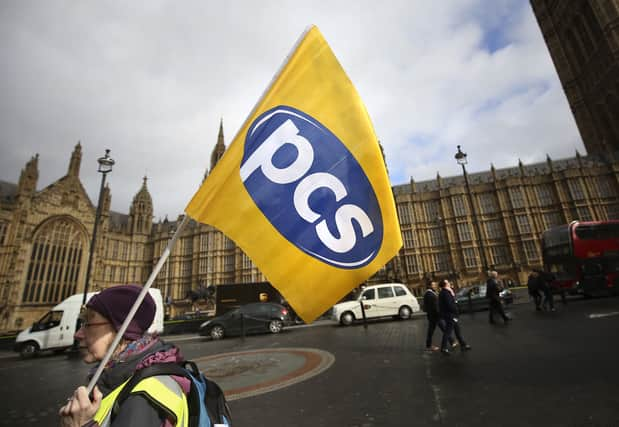Civil service strike 2022: why have PCS workers voted for industrial action - ballot results explained


Around 100,000 civil servants have voted to strike in a dispute over pay, pensions and jobs, following one of the largest national ballots for industrial action so far this year.
Workers across a wide range of government agencies and public sector roles could take strike action in the coming months unless the government comes forward with “substantial proposals,” the main civil service union has warned.
Advertisement
Hide AdAdvertisement
Hide AdThe Public and Commercial Services union (PCS) said the legal threshold for industrial action had been reached in 126 separate areas, covering workers including driving test examiners, border force officials and Jobcentre staff.
The government has stressed that there are contingency plans in place and said it remains “in regular discussion with unions and staff”.
Why have civil servants voted to strike?
PCS will announce the details of industrial action on 18 November unless a new offer is made, having warned for months that flagging morale and issues with pay, job security and changes.
Pay is one of the primary issues in the dispute, with workers outraged at an offer of 4.5%, up slightly from the 2% previously put forward, but still lagging way behind inflation. PCS is calling for a pay rise of 10% for all staff.
Advertisement
Hide AdAdvertisement
Hide AdThe ‘insulting’ offer comes after 11-years without a real-terms pay increase has left many workers struggling, even before the recent cost of living crisis exacerbated the issue.
A survey of PCS members found that 52% are worried about losing their home, 40% have had to use credit to pay for essential shopping and more than one in three have skipped meals because they had no food.
The impact of these cuts will not only be felt by individuals, but also in the delivery of services which Truss is set to rely on, with the survey also finding that 37% of respondents are looking for a job outside the civil service.
The civil service has also been subject to significant criticism from ministers in recent months, particularly over working from home.
Advertisement
Hide AdAdvertisement
Hide AdUntil recently, civil servants were being threatened with cuts of 91,000 jobs, and while this target has been dropped, there is still a feeling that some cuts will be likely as well as significant spending cuts in the upcoming spending review.
General secretary Mark Serwotka said: “The Government must look at the huge vote for strike action across swathes of the Civil Service and realise it can no longer treat its workers with contempt.
“Our members have spoken and if the Government fails to listen to them, we’ll have no option than to launch a prolonged programme of industrial action reaching into every corner of public life.
“Civil servants have willingly and diligently played a vital role in keeping the country running during the pandemic but enough is enough.
Advertisement
Hide AdAdvertisement
Hide Ad“The stress of working in the civil service, under the pressure of the cost-of-living crisis, job cuts and office closures means they’ve reached the end of their tethers.
“We are calling on the Government to respond positively to our members’ demands. They have to give our members a 10% pay rise, job security, pensions justice and protected redundancy terms.”
A government spokesman said: “We regret this decision and remain in regular discussion with unions and staff.
“As the public would expect, we have plans in place to keep essential services running and minimise any potential disruption if strikes do go ahead.
Advertisement
Hide AdAdvertisement
Hide Ad“The public sector pay awards are a careful balance between delivering value for money for the taxpayer and recognising the importance of public sector workers.”
Which parts of the civil service could be hit by strike action?
There were 126 employer areas where the 50% turnout threshold required by law for strike action was met and a majority voted in favour of strike action.
These include a number of key government departments, including the Home Office, the Department of Work and Pensions, the Department for Education and the department for Business Energy & Industrial Strategy.
A Home Office spokesman added: “We are disappointed that the union has voted in favour of industrial action.
Advertisement
Hide AdAdvertisement
Hide Ad“Our priority will always be to keep our citizens safe and borders secure, and we will not compromise on this.
“As the public would expect, we have plans in place to minimise potential disruption during possible strike action, while still carrying out essential checks.”
National Highways, the Government-owned company responsible for England’s motorways and major A roads, says it has about 600 PCS members out of 6,000 employees.
Its executive HR director Elaine Billington said: “We are aware PCS have communicated their national ballot results.
Advertisement
Hide AdAdvertisement
Hide Ad“We are reviewing the impact any strike action may have and will put resilience plans in place to ensure the continued safe operation of our network.”
A Parole Board spokesman said: “We are aware of the potential for a small number of staff to go on strike, but we are confident that we are in a position to ensure no parole reviews are impacted.
“We do not anticipate any impact on hearings or any delay in the parole process.”
It is understood that water regulator Ofwat does not have any customer facing services, so water customers should not be directly affected by strike action.
It will aim to minimise any disruption to services if a strike does go ahead.
Comment Guidelines
National World encourages reader discussion on our stories. User feedback, insights and back-and-forth exchanges add a rich layer of context to reporting. Please review our Community Guidelines before commenting.
